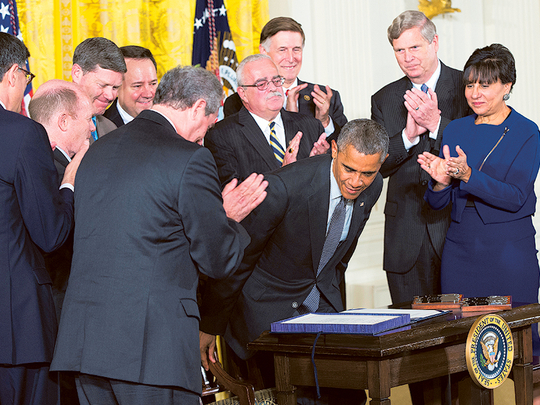
Washington: Companies from Nike to UPS stand to benefit as the US edges closer to the most sweeping trade accord in two decades.
The Trans-Pacific Partnership, which would broaden cooperation on Pacific trade and boost US influence in Asian markets, may move forward now that the Senate voted June 24 to grant President Barack Obama so-called fast-track authority to pursue trade deals.
Businesses as varied as Nike, General Electric, and United Parcel Service say an agreement may boost overseas sales, reduce import costs and lead to employment growth.
“Any kind of huge multinational company would like something like this,” said Caitlin Webber, a trade policy analyst with Bloomberg Intelligence. “It gives them more flexibility in their supply chain, more certainty about investing.”
Labor groups are fighting the proposed Pacific accord, which would eliminate some tariffs and govern intellectual property and other aspects of Pacific commerce. Breaking down barriers between the US and 11 other countries could lead to an exodus of American jobs to low-cost locales, while also hurting smaller domestic companies, they say.
The accord, which would link the US, Canada and countries including Japan, Australia and Vietnam, would be the most significant since the North American Free Trade Agreement was passed 20 years ago. Obama’s administration is also pushing the Trans-Atlantic Trade and Investment Partnership, a proposed free-trade deal between the US and the European Union.
The Senate action could set the stage for full approval of the Pacific deal this year or next.
Reducing cross-border costs could directly benefit the apparel and shoe companies that have been increasing staffing in Vietnam, which has emerged as a low-cost manufacturing alternative as wages have risen in China, Webber said.
Nike, which makes Air Jordans and other popular shoes in Asia, said fast-track authority and the Pacific accord could generate as many as 10,000 new US manufacturing and engineering jobs at the company and its partners in the next decade as tariff reductions make it easier to invest in the US.
Obama visited the shoe-maker’s Beaverton, Oregon, headquarters last month to speak about the possible benefits of a trade pact.
GE, one of the largest publicly traded exporters in the US, has been vocal in support of free trade efforts and reauthorization of the Export-Import Bank’s charter. In a recent speech in Washington, CEO Jeffrey Immelt said rejecting the trade accord would hurt US companies and ultimately workers.
“If you’re on the side of small and medium-sized businesses, you should be voting for free trade,” Immelt said.
UPS CEO David Abney said in an interview that “there is nothing more important” than a trade agreement for companies like his. “Every time the US signs a free trade agreement, we see package exports grow 20 per cent,” Abney said.
Drugmakers expect a trade deal to extend the Food and Drug Administration’s decades-long period of drug exclusivity to participating countries, including those that have weaker regulatory regimes. While that would hurt generic drugmakers, it may benefit companies such as Pfizer, Merck & Co and GlaxoSmithKline, which could postpone cheaper non-exclusive versions of their drugs from entering foreign markets.
Without competition from generic drug companies, brand drugmakers can have greater control on pricing overseas. It could also encourage large companies to expand to countries they might have previously avoided, said Mark Grayson, a spokesman for Pharmaceutical Research and Manufacturers of America, a trade organization for large drug manufacturers.
“If they don’t have a strong IP protection, then their medications could be pirated,” he said. “With stronger IP protections, we would be able to sell our medicines and introduce them in every country.”
Agriculture groups have supported a possible trade pact because it could give US farmers greater access to growing export markets. The industry sends $2 billion of product each year to Japan even with tariff barriers.
While big producers may benefit, smaller farmers could get squeezed as large-scale production is moved to lower-cost locations, said Karen Hansen-Kuhn, director of international strategy at the Institute for Agriculture and Trade Policy.
Labor groups have battled the legislation, saying it will lead companies to ship jobs overseas. Larry Cohen, former president of Communications Workers of America, which represents 700,000 workers, said it could also harm call-center workers and other non-manufacturing positions.
“There’s nothing good in this unless you’re a multinational corporation concerned about your investment rights,” Cohen said. “For everybody else it’s only a question of how harmed will you be. The apparel industry, auto parts, electronics don’t stand a chance.”












